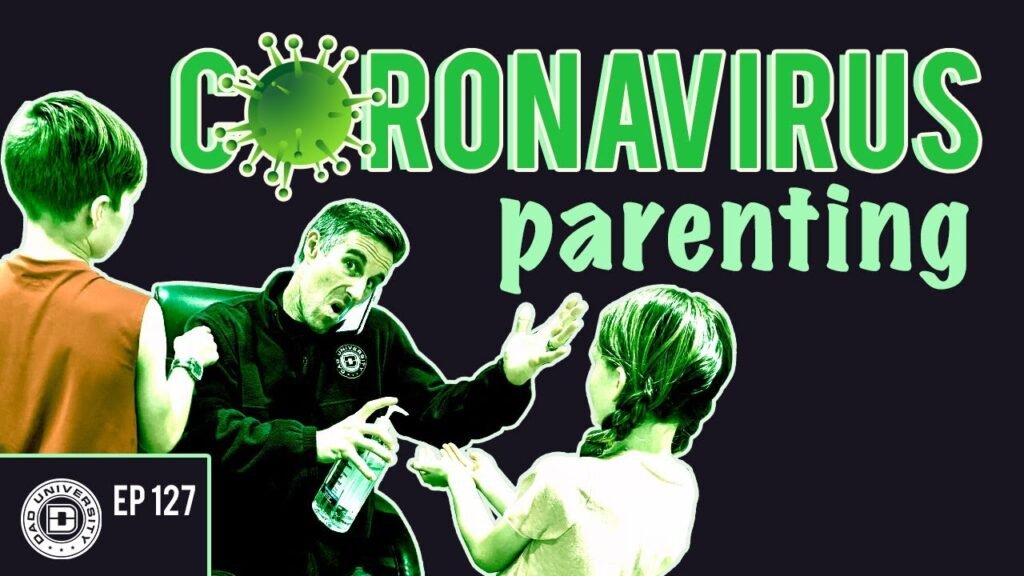In the midst of the coronavirus pandemic and worldwide lockdowns, parents are facing new challenges and responsibilities as schools and childcare facilities remain closed. However, Dad University’s Jason is here to offer some valuable parenting tips that have worked for him and his family during this quarantine period. With the added stress and anxiety caused by the outbreak, it’s crucial for parents to prioritize open communication and honesty with their children about the situation. Creating a routine provides stability and predictability, while allocating time for exercise and active play promotes their physical and mental well-being. Lowering expectations and being flexible are essential during these challenging times, and maintaining a positive attitude and practicing gratitude can greatly impact household dynamics. Finally, self-care for parents is emphasized, so they can be there for their children throughout this challenging period. Remember to share this video and stay healthy!
With the coronavirus pandemic leading to worldwide lockdowns, parents are finding themselves in new roles and facing additional challenges as schools and daycare facilities are closed. Dad University’s Jason provides valuable parenting tips that have helped him and his family during this quarantine. Stressing the importance of honesty and open communication with children about the situation, the video highlights the significance of establishing a routine for children’s stability and predictability. Additionally, allocating time for exercise and active play promotes their overall well-being. The importance of being flexible and lowering expectations is emphasized, along with maintaining a positive attitude and practicing gratitude. Self-care for parents is also emphasized, ensuring they can provide support and care for their children. Don’t forget to share this video and stay healthy!

Honesty and Open Communication
During this challenging time, it is important to be honest and open with your children about the situation. While the level of information you provide will depend on their age, it is essential to answer their questions honestly. If they don’t have any specific questions, there is no need to volunteer information they don’t need to know. However, if they are asking, be direct and truthful in your responses.
To ensure that you have accurate and reliable information to share with your children, refer to reputable sources such as the Centers for Disease Control and Prevention (CDC) and the World Health Organization (WHO). These organizations provide guidance on how to talk to children about the situation and offer valuable resources for parents. By staying informed and providing accurate information, you can help alleviate any anxiety or confusion your children may be experiencing.
Encourage your children to express their feelings and emotions openly. Create a safe space where they can share their concerns, fears, or even their thoughts on the current situation. By listening attentively and validating their emotions, you can provide reassurance and comfort during these uncertain times. Let them know that it is okay to feel a range of emotions and that you are there to support them.
Setting Up a Routine
One effective way to provide stability and predictability during the quarantine is by establishing a daily routine. Children thrive on routine, and it helps them know what to expect. Involve your child in creating their own schedule, so they feel a sense of ownership and are more likely to follow it.
Include specific times for learning and schoolwork, especially if they are participating in remote learning. Allocate time for play and relaxation, as children also need opportunities for free play and downtime. In addition, ensure consistent sleep and meal times to maintain a sense of structure in their day.
Having a routine not only helps children feel secure but also gives parents some much-needed structure and predictability. It allows you to plan your day accordingly and ensures that everyone in the household knows what to expect.
Exercise and Active Play
Physical activity is crucial for children’s overall well-being, both physically and mentally. If possible, encourage outdoor activities that allow for exercise and fresh air. Taking walks, bike rides, or playing in the backyard are great options to keep children active while maintaining social distancing guidelines.
In cases where going outdoors is not an option, make use of online exercise videos designed for children. Many platforms offer fun and interactive workouts that can be done at home. Setting up indoor games and physical activities can also be a great way to keep children moving and engaged.
Additionally, incorporate movement breaks throughout the day. Encourage your children to stretch, do simple exercises, or participate in short dance breaks. These breaks not only provide physical activity but also help release energy and improve focus during learning or other sedentary activities.
Lowering Expectations and Being Flexible
Understand that this is an unprecedented situation, and things may not always go as planned. It is important to adjust your expectations, both for yourself and your children. Academic performance may not be at its usual level, and that’s okay. Lowering academic expectations during this challenging time is crucial to prevent added stress and anxiety for both parents and children.
Be understanding of emotional ups and downs. Your children may experience a wide range of emotions during this time, including frustration, sadness, anger, or even moments of happiness. Allow them to express their emotions without judgment and provide comfort and support when needed.
Adaptability is key during this ever-changing situation. As circumstances shift, be prepared to adjust your routines and plans accordingly. Being flexible and open to change will help make the transition smoother for everyone involved.
Maintaining a Positive Attitude
Modeling positivity and optimism is essential during these challenging times. Your attitude can greatly impact your children’s well-being and how they perceive the situation. Focus on the silver linings and highlight any positive aspects that arise from the circumstances.
Practice gratitude as a family. Take time each day to reflect on the things you are grateful for, whether it’s good health, quality time with family, or simple pleasures. By cultivating gratitude, you can shift your mindset towards positivity and help your children develop a positive outlook as well.
Find joy in simple activities and create opportunities for laughter and playfulness. Engage in activities that bring you and your children joy, such as playing board games, watching movies together, or even having a dance party in the living room. By prioritizing joy and positivity, you can help create a more harmonious environment at home.
Self-Care for Parents
During this time, it is crucial to prioritize self-care as a parent. Taking breaks and time for yourself is not selfish but necessary to recharge and maintain your well-being. Find moments throughout the day to engage in activities that bring you joy or help you relax.
Prioritize sleep and rest. Establish a consistent sleep schedule for yourself and ensure you are getting enough restful sleep. Quality sleep plays a significant role in managing stress and maintaining emotional well-being.
Engage in activities that bring you joy and help you unwind. Whether it’s reading a book, practicing a hobby, or taking a warm bath, make time for activities that nourish your soul and provide relaxation.
Seek support from other parents or professionals. Connect with other parents who may be going through similar experiences. Share your thoughts, frustrations, and successes with each other. Additionally, consider reaching out to professionals, such as therapists or counselors, who can provide guidance and support during this challenging time.
Remember, taking care of yourself is crucial to your ability to care for your children effectively. By prioritizing self-care, you are better equipped to handle the challenges that may arise.
Supporting Children’s Emotional Well-being
Creating a safe space for your children to express their emotions is essential during this time. Let them know that it is okay to feel scared, confused, or upset. Assure them that you are there to provide love, support, and comfort.
Provide reassurance and comfort by consistently reminding your children that their safety is your top priority. Share information with them in an age-appropriate manner, emphasizing the steps your family is taking to stay healthy and safe.
Teach coping strategies for anxiety or stress. Help your children develop healthy ways of managing their emotions, such as deep breathing exercises, mindfulness techniques, or engaging in creative activities like drawing or journaling.
Monitor and limit exposure to news and media, as excessive exposure can increase anxiety and distress. Be mindful of the information your children are consuming and provide them with accurate updates in a calm and reassuring manner.
Engaging in Meaningful Family Time
Now, more than ever, is the perfect time to strengthen family bonds and create lasting memories. Plan activities that involve the whole family and allow for quality time together.
Having regular family meals together can provide an opportunity for open communication and connection. Use this time to share stories, discuss your day, or simply enjoy each other’s company.
Engage in activities that promote togetherness and create shared experiences. Play games, read books, or watch movies together. These activities foster a sense of unity and create memories that your children will cherish.
Use this time to reconnect with your children and strengthen your relationships. Show them love, appreciation, and support. By prioritizing meaningful family time, you can create a positive and nurturing environment within your household.
Encouraging Learning and Skill Development
While schools may be closed, there are still plenty of opportunities for children to continue learning and developing new skills.
Explore educational resources available online. Many websites offer interactive learning activities and educational videos that align with school curriculums. Encourage your children to explore these resources and engage in activities that stimulate their intellectual growth.
Encourage reading and learning through books. Set aside dedicated reading time each day where your children can choose books that interest them. Reading not only enhances their literacy skills but also expands their knowledge and imagination.
Teach practical life skills through daily activities. Involve your children in daily chores and household tasks, such as cooking, cleaning, or gardening. This not only helps them develop responsibility but also builds valuable life skills.
Support their interests and hobbies. Whether it’s painting, playing a musical instrument, or coding, encourage your children to pursue their passions. Provide them with resources, materials, or online classes that align with their interests.
By promoting a love for learning and skill development, you can help your children continue their growth and education during this time.
Conclusion
During the coronavirus quarantine, parenting may present new challenges and responsibilities. However, by implementing these tips, you can create a calmer and smoother environment in your household.
Remember to prioritize honesty and open communication with your children, adjusting the information shared based on their age. Establishing a routine provides stability and predictability, while incorporating exercise and active play promotes physical and mental well-being.
Lower your expectations and be flexible, adapting to changing circumstances as needed. Maintain a positive attitude and practice gratitude as a family. Prioritize self-care to ensure you can be there for your children, and support their emotional well-being by creating a safe space for expression.
Engage in meaningful family time and encourage learning and skill development. By following these tips, you can navigate the challenges of parenting during the coronavirus quarantine with strength, resilience, and love. Remember, you are not alone, and together, we can get through this.

